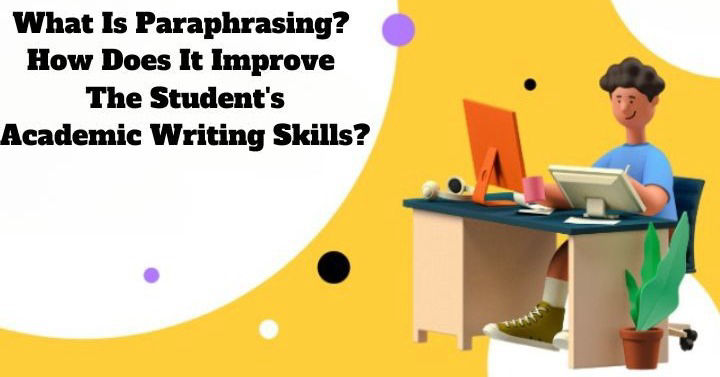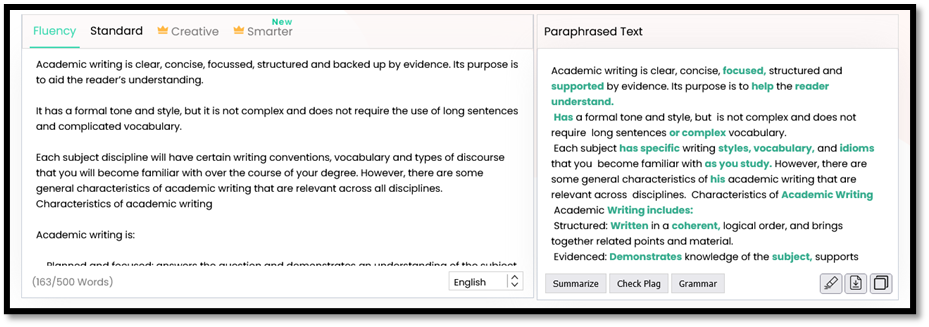What Is Paraphrasing? How Does It Improve Student's Academic Writing Skills?

Academic writing can be a challenging phase for a student. So, how can paraphrasing help with it?
Paraphrasing is an important skill to learn for students. However, the more important thing is learning how to do it properly. Research suggests that 38% of students paraphrased text without citing the source. In the process, they plagiarized text without knowing, all because of a simple mistake.
That's why it's important to understand what paraphrasing is and how it works. On top of that, it's also important to grasp how it can help a student's academic writing skills. We'll explore all these in this article, so let's get started.
What Is Paraphrasing?
Paraphrasing is the process of restating an idea, statement, or text using one's own words. It is a form of rewriting and can be used in various types of content. It's also a common technique of re-expressing someone else's idea in a different way while maintaining the same meaning.
It is not a form of plagiarism because it does not involve copying. Thus, paraphrasing is an important skill that’s used by writers for various goals. It is often used when writing essays, reports, or other academic papers.
It can also be used in conversation when you want to say something but don't want to use the exact words that someone else said before you. However, in writing, paraphrasing can have many different purposes, such as:
- Tweaking vocabulary to express something in different words
- Changing the delivery without altering the context
- Changing the content tone without affecting the idea
- Changing content voice, i.e., from passive to active or vice versa
- Altering language to present something in a different language
Therefore, the importance of paraphrasing is adamant in any sort of writing. For a student or professional writer, paraphrasing is a way out of tricky situations. While we'll explore those a bit later, it's important to understand that paraphrasing is a must-have skill for any writer today.
Mainly because it elevates the content but it also improves the writer's position. Whether in professional or academic settings, paraphrasing is a skill that can help a writer deal with any content-related situation.
Why Is Paraphrasing Important?
Paraphrasing is a necessary practice that helps people to understand the meaning of what they read. It is also a powerful tool for those who want to be more persuasive, as it helps them to make their point without sounding too repetitive.
It can be used to articulate your thoughts and ideas more clearly, as well as help you come up with new insights and perspectives on an issue. However, in this context, Paraphrasing is a technique used by writers to express an idea or argument in different words.
It is also called rewording or restating. Paraphrasing is important because it helps the reader understand the original text more clearly by adding more clarity to it. On the other hand, it can help the writer achieve many things, such as:
- Altering the content's meaning
- Changing the content's tone
- Elevating the content's quality
- Removing plagiarism
- Learning new skills and useful ways of writing content
As you can see, besides the beneficial aspect, paraphrasing presents a learning curve. Not only does it help you become a better writer, but it also elevates the overall quality of what you write.
Therefore, it's not only important; it's a necessity in today's world—in both academic and professional scenarios.
How Does Paraphrasing Improve a Student's Academic Writing Skills?
Paraphrasing can help a student become a better writer. In the process, not only does it improve their ability to write better, but it also helps them understand major aspects of academic writing. Four of them are:
1. It Teaches How to Remove Plagiarism
One of the many benefits of knowing how to paraphrase is that it helps you remove plagiarism. Not only does it save time, but it also does it efficiently. Since plagiarized content is often similar to the original source, paraphrasing can teach students how to rewrite properly.
In the process, it saves time and allows them to grasp the right idea of removing or avoiding duplicate content. Once this skill is added to a writer's arsenal, coming up with original ideas and executing them isn't a problem anymore.
2. It Shows How to Improve Fluency
Fluency in any kind of text can make it better tenfold. It's easy to read once the text is more fluent and easy to understand. That's one of the main purposes of rephrasing, as it helps the writer achieve better clarity.
Therefore, when students use a paraphrasing tool or learn manual paraphrasing, they can understand this skill very well. It also gives them the ability to easily convey complicated topics, allowing a common reader to understand something in layman's terms.
3. It Explains How To Change Content Tones
Content tones are yet another key aspect of any sort of writing. In academia, writing in various content tones may not be a standard requirement, but it does come in handy to know how to do it. And paraphrasing tells you just how to do that.

Whether by altering the context or changing the voice from active to passive, content can be read differently. In other words, paraphrasing teaches you how to write in conversational, formal, or informal styles.
4. It Improves Writing Quality
Lastly, improving writing quality is one of the key responsibilities of any writer. Paraphrasing allows you to get a second opinion of your own writing—by yourself. This is one of the rare and often unspoken gifts of paraphrasing.
It allows you to have a subjective look at your own work. Therefore, once you rewrite something you've already written, it comes out better than the initial form. Why is that? Because it improves your overall writing quality.
How Should You Paraphrase?
Paraphrasing is a straightforward process once you get the hang of it. In order to paraphrase properly, you need to do the following:
Peruse the Original Source -
The first step is to read the original source of your content. The more you understand it, the easier it will be for you to grasp an idea of how to rewrite it. Once you understand the concept, decide what you wish to do next:
- Do you need the change the entire text?
- Do you need to fix only a few bits?
- Do you need to remove the plagiarized section?
Therefore, once the objective is clear, move on to the next step.
Rewrite Text -
The next step is to rewrite/paraphrase your text. But, how exactly do you do that? Here are a few things to remember when rewriting text:
- Use alternative synonyms
- Avoid expositions
- Try to change voice, from passive to active (preferably)
- Try to achieve better clarity
- Cite the original source (in case of plagiarized text
Once done, try to ensure that you meet the length of the original text. Therefore, if your original content was 100-words, then the rewritten text shouldn’t be less than 80-90 words.
Fix Grammatical Issues & Ensure Quality -
Grammatical issues can still occur if you’re rewriting already stellar content. Therefore, try to fix grammatical issues and ensure the quality of your text. Try to rewrite shorter sentences, paragraphs and focus on readable words.
Bonus Tip: Use a Paraphrasing Tool -
The final tip on this list is to use a paraphrasing tool you can simply avoid all this hassle by using a paraphrasing tool. Such as this one by Paraphraser.IO

So, if you’re short on time and need to rewrite content efficiently, simply rely on the AI’s advanced algorithms to rewrite your text.
Conclusion:
These are the key benefits of paraphrasing, which can help students in their academic writing ventures. It will ensure high quality of text and teach them how to rephrase content to achieve various goals. But, we suggest using a dependable tool, like the one we mentioned, to achieve said advantages.



